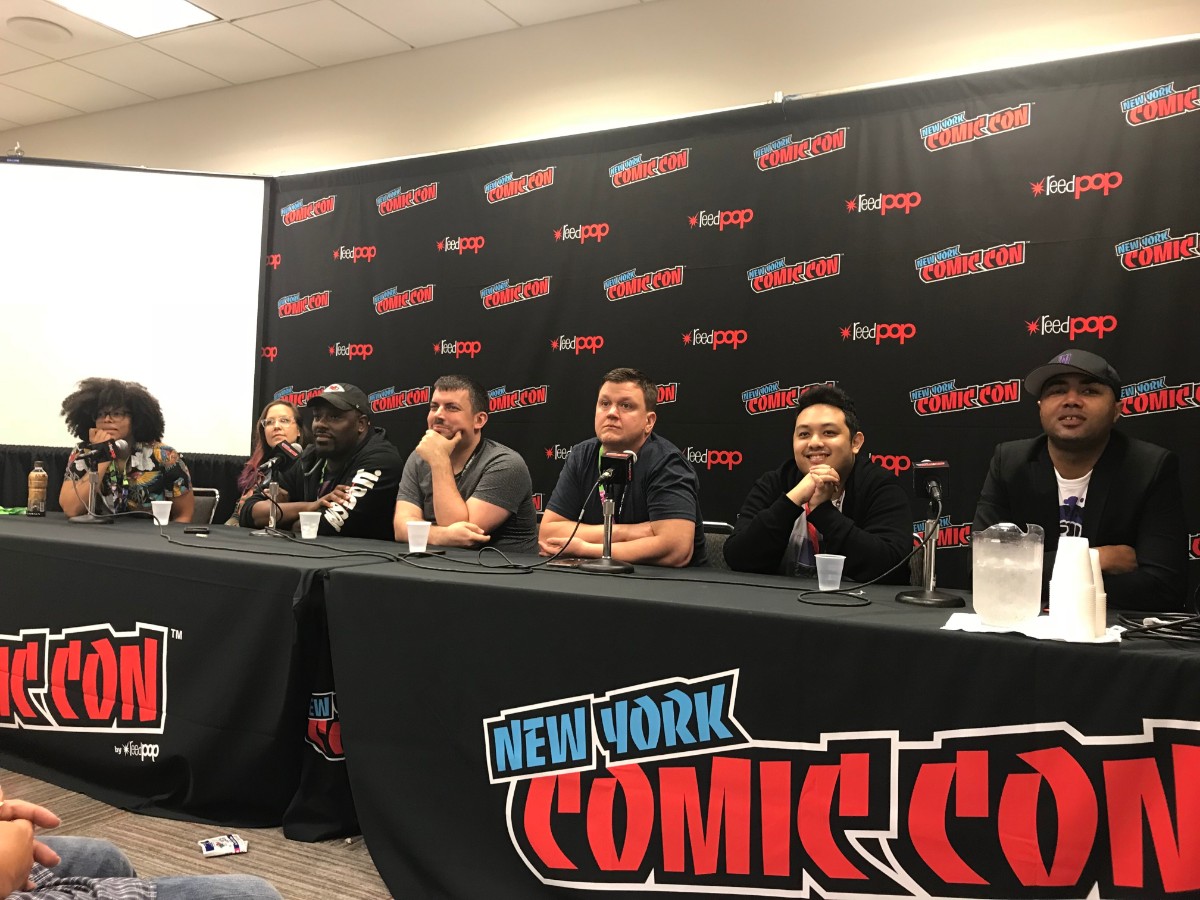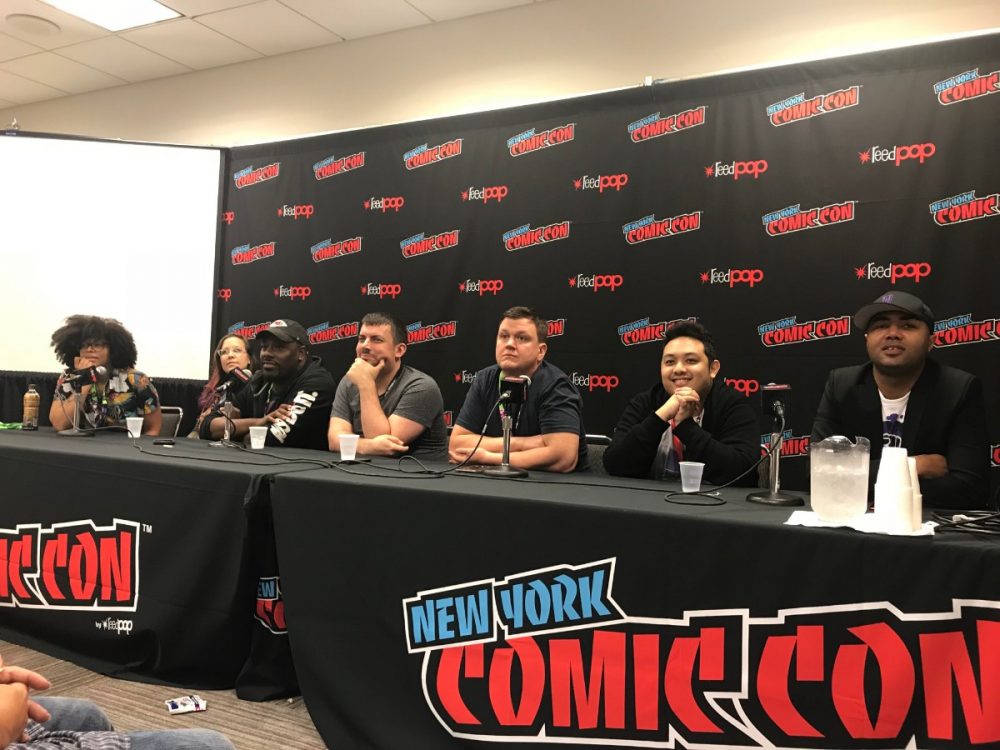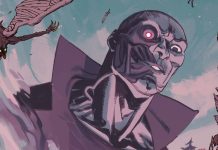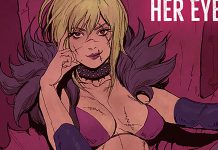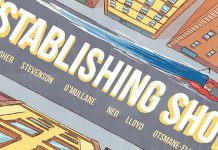By Samantha Puc
If you ask any of the creators who spoke on the “Black Mask: Dangerous Comics” panel on Thursday night at New York Comic Con, they’ll tell you that their books are dangerous because they push boundaries and transgress the norm even for creator-owned series.
Well, except for The Wilds co-creator and Black AF: Devil’s Dye writer Vita Ayala, whose books are apparently homicidal. “My single issues go out and murder people at night,” Ayala said. “That’s why they’re dangerous.”
Then they added, more seriously, “If the need for my use of block chain is anything to go by, then I would imagine that just showing a different perspective is apparently dangerous. Boldly telling the stories that we want to tell about who we want to tell them about seems to offend.”
Ayala’s candor opened the floor for fellow Black Mask creators Kwanza Osajyefo (Black, Black AF), Fabian Lelay (We Are the Danger, Jade Street Protection Services), Eric Palicki (No Angel), Joe Corallo (editor, Oh S#!t It’s Kim & Kim), Tony Patrick (X’ed), and Liana Kangas (artist, Black AF: Devil’s Dye) to discuss the work they do in creator-owned comics and how it differs from the mainstream. They also talked about how telling the stories they want to tell can lead to real-life danger from people who aren’t as interested in what they have to say.
Osajyefo’s Black has been optioned for film, but he’s nowhere near done creating the world (mostly in limited series) at Black Mask. The next mini-series in the Black AF ‘verse is Devil’s Dye, which Kangas said she has a lot of creative freedom on.
“That’s kind of surprising just because, you know, I have a very unique style and I got to try new things that I wouldn’t normally do on most — I wouldn’t say licensed books, but you know, like my own creator-owned series,” Kangas said.
“I was really a fan of the series before I got to play in the world,” Ayala added. “The conceit is so interesting to me and I really wanted to push what that would be like from the perspective of a character that we’ve seen before but not really heard a bunch from. Working with Liana is really, really cool because we get to kind of craft this story with plotting by Kwanza but really, he gives us enough freedom to put ourselves into the story, which is really cool. We get to talk about the things we want to talk about through these characters.”
Meanwhile, outside of the Black verse, Lelay is “the face of YA” at Black Mask with We Are the Danger, which relies on music and Filipino appreciation for music to tell its story.
“I felt like these were stories that were under-told and were undersaturated in the market,” Lelay said. “I just wanted to tell them. I feel like I was comfortable growing up with anime and music around me. I just wrote what I knew and that I felt translated into the books [including Jade Street Protection Services]. If it represents teen issues, then great — I feel like the teens nowadays are changing from what we were when we were younger in our generations, and I think we need to understand and cultivate what the youth is going to be or kind of remember what we were. We can build something for them in the future.”
Palicki’s No Angel, which he co-created with his sister Adrienne Palicki, primarily explores family, though the book also features heavy religious themes, which he said were a vehicle more than anything else.
“I didn’t need to attack religion and I didn’t need to use this as an opportunity to proselytise,” Palicki said. “It’s really just there as a way for me to convey these deeper themes, and as you see, some of the most religious people take it to the point of fanaticism in the book. I guess if we’re talking about a fact-based world, that’s definitely something we can see in the real world. I did not want that to be what the book was about, especially as a Black Mask book. That wouldn’t have really felt like a Black Mask book to me.”
“I don’t think that you get much crazier than a Black Mask book — or more dangerous,” he added. This posed an interesting dynamic for Palicki and Adrienne, because her work in Hollywood made her look at everything he drafted for the book through a Hollywood lens.
As an editor on Oh S#!t It’s Kim & Kim, Corallo said that because this series is an ongoing, rather than a mini-series, his work primarily deals with helping the creators plot far in advance for character and plot arcs.
Patrick admitted that he was added to the panel last-minute, joking, “Why am I here?” before talking about his Black Mask series X’ed. “Is that like a Black Mask Classic now?” he asked, then joked with Ayala about potentially launching an imprint featuring books that were planned, but never released.
“[X’ed] was considered dangerous because we were exploring the human psyche and our inner demons,” Patrick said. “The reason why I’m back here is that I had a very interesting year. I was in the DC Writers Workshop along with some other names here and ended up writing Batman and the Signal in the last year. I’m not here to promote DC, but [Black Mask] is my home. I feel very loyal and this is where I got my start, so I’m looking to tell more stories there if possible. [To talk about] the new frontier of dangerous comics and to promote Black Mask Classic,” he added.
Ayala’s other series through Black Mask, co-created with artist Emily Pearson, is The Wilds: a zombie series where the zombies are growing plants rather than decaying flesh. They said they wanted to play with why we are so afraid of zombies, which are often said to be a metaphor for consumerism or late-stage capitalism.
“What we really wanted to talk about with the zombies in particular was that some of the most dangerous and vile things are beautiful,” Ayala said. “It’s very easy to make something really, really evil seem very reasonable with just a few sweet words. Stuff like that. We wanted to talk about that and how things that seem very natural are not and they can hurt you.”
“If you want to go real danger, I’ve been doxxed by haters who’ve posted my address and pictures of my spouse and stuff in shitty forums,” Osajyefo said, early in the panel. “Oh yeah, I kept that a secret for a while. But when you talk about the real danger of telling stories like this, anytime you’re kind of pushing against norms and things that people for whatever strange reason are uncomfortable with — like, ’Oh, no, you told a story about black people.’”
“We’re in a climate right now where people seem to be like, really anxious about things that I don’t think any of us knew were a problem, you know, like women voting and having rights over their entire body,” Osajyefo added.
As for why Black Mask is particularly unique among current comics publishers, even other creator-owned studios like Image Comics, Osajyefo said that other publishers don’t understand publishing and promoting books about black characters by black creators. He said he often puts projects on Kickstarter, like Black, because other publishers don’t see the value of them — but actual consumers and comic readers do.
“People actually want to see a story like this, so I think things like that are why you see shifts and changes in the mainstream, because it’s happening on the indie scene,” Osajyefo said.
The diversity of books being published at Black Mask reflect not only a creator base determined to put their own experiences into comics in an interesting, impactful way, but also the future of comics. As noted by Osajyefo, the publisher is “consistently cutting-edge.”
To find out more about the future of comics at Black Mask Studios, including NYCC-specific updates and announcements, follow their social media at /blackmaskstudio or follow our coverage at #beatnycc18.


